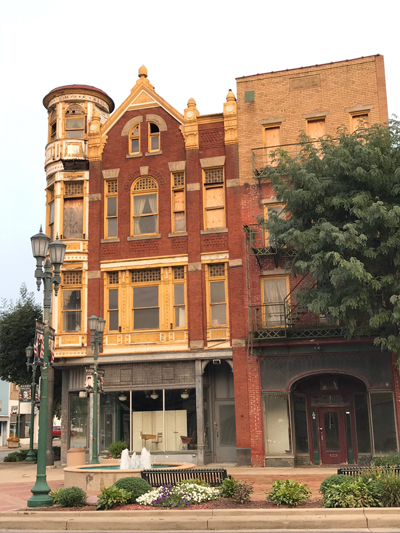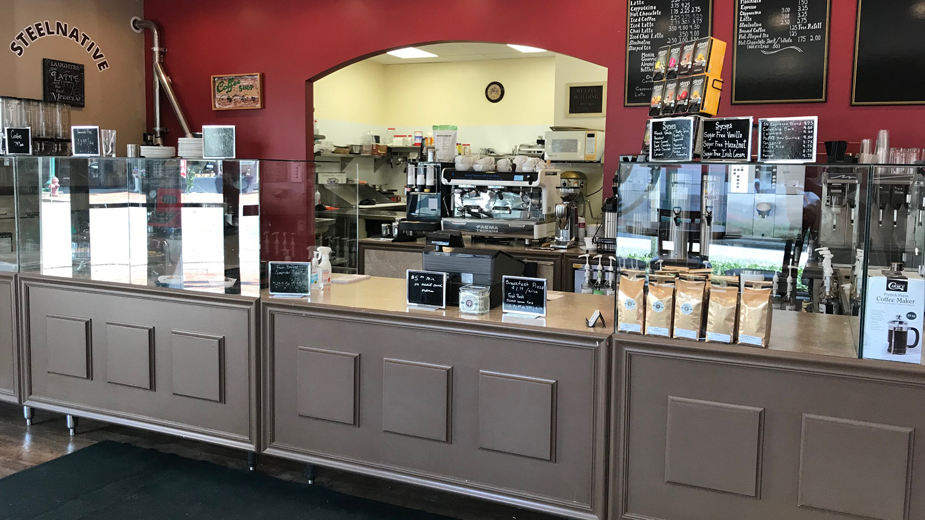EAST LIVERPOOL, Ohio – Since its inception, the East Liverpool Community Improvement Corp. has served as a conduit for those wanting to begin a business, offering assistance and funding. Its president, Patrick Scafide, says the nonprofit organization has enjoyed considerable success.
“We’re bucking the trend of [new] small businesses not lasting a year,” Scafide says, pointing to several enterprises in the city that have persevered even through the COVID pandemic.
The CIC’s revolving loan fund has been a success, Scafide says, noting five or six businesses that have taken advantage are “going strong.”
In an interview at Steel Native, a coffee shop that opened last fall in the city’s downtown, and just up the street from Fresh on Fifth, a restaurant which has been open slightly longer, Scafide says both are examples of how the revolving loan program can help a business get started.
More recently, however, the CIC has forked out into another direction, hoping to provide not only funding, but space, for potential commercial enterprises by saving some of the empty buildings that dot the community.

“We’ve seen too much of people buying them and then sitting on them for years. So we decided to work with the [Columbiana County] Land Bank and acquire some of the buildings,” Scafide says.
First on the list is the iconic Thompson Building, which was headed for sheriff’s sale, enabling the CIC to acquire it for “basically nothing.”
“The idea is to entice someone to come in and save it and develop it into a usable building,” Scafide says of these acquisitions.
With its circular turret and eye-catching facade, the Thompson Building is centered in the historic district on Devon’s Diamond and is often the building visitors use to identify the city. It has been vacant for some time and fallen into disrepair.
Mayor Greg Bricker has applied for a $250,000 Community Development Block Grant and the CIC has agreed to put up an additional $50,000 if the grant is secured. This money would be used for much-needed roof repairs, window replacement, facade renovation and general cleaning.
These steps the city and CIC have taken could eliminate much of the cost of acquisition, cleaning and exterior renovations for a developer who could then acquire the building at a reasonable cost and finish renovating the structure for reuse.
Scafide says he took it upon himself to contact the owner of another vacant downtown building to ask if he would be willing to donate it to the CIC. The response was favorable, provided the CIC pays for a tax value appraisal.
Since the CIC is a 501(c)3 nonprofit, the owner can obtain a tax credit for donating the building, Scafide says.
The former Dan’s Bar on Sixth Street was also given to the CIC for just the $3,000 in taxes owed as part of a development plan.
Lest anyone think the CIC is focused solely on the downtown, Scafide says it has also agreed to acquire several Land Bank-owned parcels in the East End portion of the city for the developer of a major project being eyed there.
City Council changed the zoning classification of 16 parcels in the Pennsylvania Avenue/Mulberry Street area from B-1 and R-3 to B-4 Industrial to allow for the project.
Full details of the project have not been divulged. The applicants, George Kanj and Josee Daniel of 1st Point Inc., reportedly plan to develop a large service station there, according to officials.
Scafide says the CIC recently sold its lease for a cellphone tower for $150,000, with that money available for projects or investing. “We have money to lend. When you have money to lend and it’s not lent, they you have failed. ‘Improvement.’ That’s what we’re supposed to be doing,” Scafide says of the CIC.
Mayor Bricker says the county port authority “helped tremendously” in preparing the application for the CDBG funding and agrees it will be a “positive” if the Thompson Building can be saved for a potential developer.
While vacant commercial buildings are obviously a concern, Bricker says, “You can’t convince me our housing problem isn’t our biggest problem.”
Of 6,000 houses in the city, Bricker estimates 1,000 sit empty, which he says touches every city department, including water, police and fire because of squatters, drugs and fires.
The fire chief provided a report that shows there are 31 houses partially burned down. Eliminating such eyesores, Bricker says, would make neighborhoods more attractive, which he said, “ties into the broken window theory.”
Saying the county land bank has done a “phenomenal job” by razing about 160 decrepit houses throughout the city, Bricker says there are many more that need to be addressed, with his goal to see many rehabilitated.
Research has uncovered a bank in nearby Hancock County, W.Va., that will grant a mortgage based on payment history rather than credit scores, he says. He hopes this will encourage more people to buy, rather than rent, in the city, considering the current low interest rates.
Meanwhile, the city has begun the Potters Pride Initiative, aimed at housing improvements and demolition, with about $19,000 raised to date.
A committee has been formed to research how a city land bank program might function, Bricker says. “Let’s start focusing on what we do have. There are a lot of assets we have if we’re able to flip that script and focus on the positive things and build off those assets.”
The city planning department has created a spreadsheet of all commercial buildings in the city, with a list of building owners, compiled so this information can be provided to potential buyers.
Also in the works, Bricker says, is putting together a comprehensive “how to start a business in East Liverpool” plan that he says would be a “one-stop” list of all entities potential entrepreneurs should approach.
“If you want to start a business, this is where to do it. We’re certainly willing to work with anyone to make that happen,” Bricker says, adding, “We have a very business-friendly atmosphere here.”
The mayor says he is tapping into Jobs Ohio as much as possible in regard to feasibility studies that can help the city. “We are desperately in need of a master plan: Where we are and where we want to go,” Bricker says.
There is a lack of communication among government, business and the education community, a situation he hopes to see change. “Having that liaison between the three will help show what each needs,” he says.
A project approved before his election but now coming to fruition is the much-anticipated renovation of Fourth Street, which he says should be underway this month and which “ties in with everything we’re doing in that area.”
In terms of city finances, Bricker and Auditor Marilyn Bosco hope the city will not see the $400,000 deficit and fiscal emergency at year’s end that was projected earlier this year.
Admitting it has been a “challenge” with the pandemic causing losses in gasoline and income taxes and the loss of revenue from the traffic cameras that were voted out last year, Bosco says, “The best case scenario is we’ll break even at year’s end.”
It is possible, the auditor continues, the state could declare the city in fiscal watch if it lacks sufficient carry-over revenue to make beginning expenses in 2021.
“Everything is so tight,” she laments. “If we have a major fire [for example]; we never know what’s going to happen when we’re living paycheck to paycheck and can’t afford extra costs.”
Bosco says the city expects to lose $100,000 in Local Government Fund monies next year because of legislation that requires all communities in the county to lose revenue because of use of the traffic cams.
However, she says, “I was adamant: Cut expenses. Everything we have done has gotten us here.”
The loss of three police officers who took other jobs saved about $170,000, although recalling two laid-off officers ate into that savings somewhat. The city’s Cares Act federal funding is being used to help to pay costs associated with those recalled officers.
A reimbursement of nearly $113,000 from the Ohio Bureau of Workers’ Compensation for the 2018 premium was a welcome boost to the budget.
Changing insurance coverage for employees amounted to the biggest savings for the city, according to Bricker, who says, “We’ve been self-insured for years and we were able to pay off the debt we owed.”
After speaking with several insurance carriers, the city decided to contract locally with Farmers, which Bricker says will probably allow it to lock in a rate that will remain constant for 18 months, also establishing a tier structure for insuring employees that currently does not exist.
These moves should save $350,000. Bricker says, “Our main goal is to save money but also to be attractive to employees. We’re trying to make it more attractive to work for the city.”
This was one of the largest reductions in the deficit, he says, noting the savings can be put toward infrastructure, housing improvements and hiring an additional police officer.
Pictured above: Steel Native Coffee Shop on Fifth Street in East Liverpool offers coffee made from fresh ground beans and a variety of homemade goodies. It has survived the COVID pandemic through strategic moves by owner Steven Murphy.
